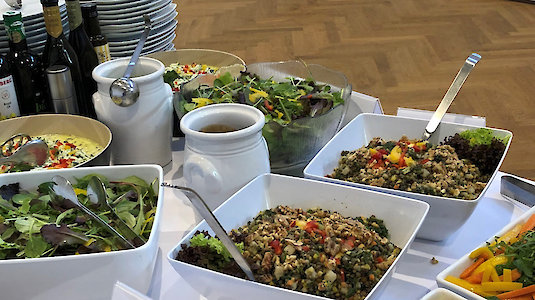Climate protection in communal catering
Food and communal catering play a special role due to their broad impact and direct influence on the health and well-being of the people being catered for. Ambitious goals have also been set in the government programme, and concrete requirements can be found in the National Action Plan for Sustainable Public Procurement (naBe Action Plan).
The requirements cover a broad spectrum, ranging from climate protection, seasonality, regionality and organic content to aspects of healthy nutrition, greater animal welfare and the avoidance of food waste. The focus in the procurement of food and catering services is on resource-saving and regional enjoyment. High-quality food from the region, a continuous increase in food from organic production, ensuring high animal welfare standards and avoiding food waste are among the requirements of the naBe criteria. Proof of compliance with the criteria can be provided, among other things, by presenting various quality labels. These include the AMA seal of quality, the organic certificate, the "Ohne Gentechnik" ("without genetic engineering") certificate, FAIRTRADE or "Geschützte geografische Angabe" ("protected geographical indication").
Austria eats regionally
The criteria and requirements in the area of food and communal catering are promoted by the forum "Österreich isst regional" (Austria eats regionally). The forum also supports kitchen managers and purchasing managers in particular in implementing the naBe criteria.
Also in the area of events, an important step towards increasing sustainable procurement is already being taken here. The naBe action plan specifies important criteria for events with less than 100 participants, such as compliance with the naBe criteria for meat or the specification of a vegetarian or vegan menu. For events with more than 100 participants, the criteria of the Austrian Ecolabel for Green Meetings and Events are required.
More information can be found here:
